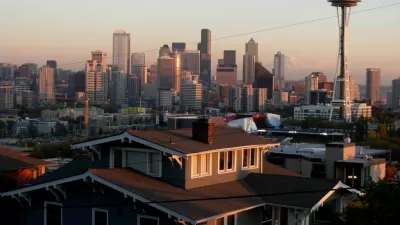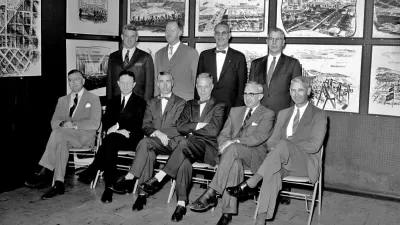The debate about police reform in Minneapolis is only one arena for the city's reckoning with systemic racism.

The protests sweeping the nation started in Minneapolis, a city that has frequently taken the lead on matters of social and economic justice among U.S. cities. But that track record hasn't done enough to overcome the discriminatory underpinnings of the racist housing covenants that stacked the economic deck against Black residents and people of color in the city.
According to an article by Jared Brey, volunteers working for the Mapping Prejudice project, first reported by Next City in 2017, have uncovered evidence of the "deep racial inequalities that contradict the city’s self-image as a bastion of progressive politics."
The city has increased funding for its Affordable Housing Trust Fund since 2018 and approved an innovative comprehensive plan to implement a supply-side approach to housing affordability by legalizing new Missing Middle density in residential neighborhoods across the city. "But housing advocates are still trying to push through tenant protections like just-cause eviction rules and rent control, while acknowledging that housing inequality can’t be undone by housing policy alone," according to Brey.
Led by The Alliance, a coalition of community groups focused on regional equity, advocates in Minneapolis are pushing for the Equity in Place policy agenda, "which would give tenants the right of first refusal when their building owner plans to sell, similar to laws in Washington, D.C., and San Francisco," according to Brey. "The agenda also includes community control of land and housing through community land trusts, reforming tenant-screening processes, and increasing funding for community organizing work."
FULL STORY: Facebook Twitter Email Minneapolis Housing Advocates Look Ahead

Manufactured Crisis: Losing the Nation’s Largest Source of Unsubsidized Affordable Housing
Manufactured housing communities have long been an affordable housing option for millions of people living in the U.S., but that affordability is disappearing rapidly. How did we get here?

Americans May Be Stuck — But Why?
Americans are moving a lot less than they once did, and that is a problem. While Yoni Applebaum, in his highly-publicized article Stuck, gets the reasons badly wrong, it's still important to ask: why are we moving so much less than before?

Using Old Oil and Gas Wells for Green Energy Storage
Penn State researchers have found that repurposing abandoned oil and gas wells for geothermal-assisted compressed-air energy storage can boost efficiency, reduce environmental risks, and support clean energy and job transitions.

California Governor Suspends CEQA Reviews for Utilities in Fire Areas
Utility restoration efforts in areas affected by the January wildfires in Los Angeles will be exempt from environmental regulations to speed up the rebuilding of essential infrastructure.

Native American Communities Prepare to Lead on Environmental Stewardship
In the face of federal threats to public lands and conservation efforts, indigenous groups continue to model nature-centered conservation efforts.

Proposed Bill Would Direct Funds to Road Safety
The Sarah Debbink Langenkamp Active Transportation Safety Act was spurred by the death of a U.S. diplomat who was killed on her bicycle.
Urban Design for Planners 1: Software Tools
This six-course series explores essential urban design concepts using open source software and equips planners with the tools they need to participate fully in the urban design process.
Planning for Universal Design
Learn the tools for implementing Universal Design in planning regulations.
Heyer Gruel & Associates PA
City of Moreno Valley
Institute for Housing and Urban Development Studies (IHS)
City of Grandview
Harvard GSD Executive Education
Salt Lake City
NYU Wagner Graduate School of Public Service
City of Cambridge, Maryland





























